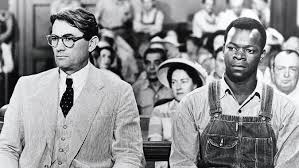The Strangeness Remains
 In To Kill a Mockingbird[1], Atticus Finch stands in a courtroom in a small Southern town, defending a man society has already judged guilty. His arguments are not just legal—they are moral. He appeals to fairness, compassion, and the dignity of every human being, even when the world around him resists. What makes this so striking, as Tom Holland argues in Dominion: The Making of the Western Mind[2], is that the very values Atticus embodies—human rights, equality, and justice—are deeply rooted in a Christian moral imagination, even in a culture that often claims to have outgrown its religious foundations. Holland highlights a paradox: the West frequently prides itself on secular ideals, yet it continues to rely on moral categories the ancient world would have found incomprehensible.[3]
In To Kill a Mockingbird[1], Atticus Finch stands in a courtroom in a small Southern town, defending a man society has already judged guilty. His arguments are not just legal—they are moral. He appeals to fairness, compassion, and the dignity of every human being, even when the world around him resists. What makes this so striking, as Tom Holland argues in Dominion: The Making of the Western Mind[2], is that the very values Atticus embodies—human rights, equality, and justice—are deeply rooted in a Christian moral imagination, even in a culture that often claims to have outgrown its religious foundations. Holland highlights a paradox: the West frequently prides itself on secular ideals, yet it continues to rely on moral categories the ancient world would have found incomprehensible.[3]
This article will explore Holland’s argument, reflect critically on its scope, and connect his insights to the ongoing influence of the gospel in shaping both culture and individual lives. It will also examine how the myth of rugged individualism, so prominent in modern American culture, intersects with and often resists the Christian vision of human flourishing.
Holland’s Contribution
Holland’s central claim is sweeping but clear: Christianity transformed the moral imagination of the West. In the Greco-Roman world, strength, honor, and hierarchy defined humanity, while weakness and humility were despised. Christianity inverted these assumptions. At the heart of the gospel was a God who embraced weakness, suffered, and died for the undeserving. Suddenly, humility was exalted, and every human life was endowed with dignity and worth.
This reimagining of what it means to be human rippled across history. From the early Church challenging Roman power structures to the rise of hospitals and universities, to the abolitionist movements against slavery, Christianity provided the moral framework that made such developments possible. Compassion for the vulnerable, equality before God, and the dignity of every person were not self-evident truths—they were distinctly Christian convictions.
What makes Holland’s argument compelling is his emphasis on continuity. Even as societies grew more secular, the moral instincts they carried forward remained Christian at their core. Modern human rights, women’s suffrage, and contemporary movements for social justice all depend on categories that would have been foreign to the ancient world but familiar to the early church.
Competing Myths
Holland himself names the heart of the tension in his work:
“If secular humanism derives not from reason or from science, but from the distinctive course of Christianity’s evolution—a course that, in the opinion of growing numbers in Europe and America, has left God dead—then how are its values anything more than the shadow of a corpse? What are the foundations of its morality, if not a myth? A myth, though, is not a lie. At its most profound—as Tolkien, that devout Catholic, always argued—a myth can be true. To be a Christian is to believe that God became man, and suffered a death as terrible as any mortal has ever suffered. This is why the cross, that ancient implement of torture, remains what it has always been: the fitting symbol of the Christian revolution. It is the audacity of it—the audacity of finding in a twisted and defeated corpse the glory of the creator of the universe—that serves to explain, more surely than anything else, the sheer strangeness of Christianity, and of the civilisation to which it gave birth. Today, the power of this strangeness remains as alive as it has ever been.”[4]
This passage captures Holland at his best. He refuses to reduce Christianity to cultural residue or moral sentiment. Instead, he recognizes that at the center of Western morality lies not an abstract principle but a crucified God. The power of Christianity, Holland reminds us, lies in its audacity: strength revealed through weakness, victory achieved through apparent defeat.
And yet, even here, Holland frames Christianity primarily as the myth that animates Western civilization. Jordan Peterson’s Maps of Meaning[5] helps clarify both the strength and the limitations of this approach. Peterson insists that myths are not mere stories but the deep structures by which human beings orient themselves toward meaning. In this sense, Holland is right: Christianity functions as the mythic foundation of the West, shaping moral imagination in ways no other narrative has matched.
civilization. Jordan Peterson’s Maps of Meaning[5] helps clarify both the strength and the limitations of this approach. Peterson insists that myths are not mere stories but the deep structures by which human beings orient themselves toward meaning. In this sense, Holland is right: Christianity functions as the mythic foundation of the West, shaping moral imagination in ways no other narrative has matched.
But Christianity does not stand alone in shaping culture. Another myth flavors the cultural waters of America: the myth of rugged individualism. While distinctively American in expression, its roots reach back to the Greco-Roman world. As mentioned earlier, in Rome, to be truly human was to exercise mastery over others, to rise above dependence, and to pursue honor and self-sufficiency. Weakness, vulnerability, and need were despised. It is not surprising, then, that this older vision of humanity—power defined by autonomy—re-emerges in the American myth of the self-made individual. Rugged individualism migrated with the earliest settlers, pushed westward with the pioneers, and continues to echo through our politics, saturate our pop culture, and, unfortunately, seep into our churches.
Where Christianity proclaims the paradox of strength through surrender, rugged individualism insists on autonomy, self-reliance, and mastery over life’s challenges. These two myths exist side by side, often in tension—one calling for trust in the crucified Christ, the other calling for confidence in the autonomous self.
Peterson’s framework helps us see why this tension matters. Myths, he argues, are not ornamental but foundational: they orient how individuals and societies navigate meaning, suffering, and flourishing. Holland is right that Christianity’s strangeness still exerts enormous influence. Yet America shows how competing myths can coexist—sometimes reinforcing, at other times undermining one another. The question, then, is not whether myths shape us, but which myth ultimately tells us the truth about life and flourishing.
_____________________________________________________________________
[1] Harper Lee, To Kill a Mockingbird, (London: Arrow, 2020)..
[2] Tom Holland, Dominion: The Making of the Western Mind, (London, UK: Little Brown, 2019).
[3] Ibid., xxix.
[4] Ibid., 524.
[5] Jordan Peterson, Maps of Meaning: The Architecture of Belief, (New York: Routledge, 1999).
9 responses to “The Strangeness Remains”
Leave a Reply
You must be logged in to post a comment.
Hi, Chad, thank you for the interesting post. If I understand correctly, you mentioned that ‘myth’ also shaped the culture? Is it a good practice for leader to be shaped or influenced by Myth? Thank you again for the post, Mr. Chad.
Noel, thank you for the great question! When I use the word myth, I don’t mean something “false” in the modern sense of the word, but rather what Tom Holland describes in Dominion—a story that carries deep meaning and helps shape how we see the world. Jordan Peterson makes a similar point, often using “myth” almost interchangeably with “story.” For both of them (and I would agree), human beings are story-formed. We don’t just live in the world—we live in the world through the stories we tell and believe about it.
So, can leaders be shaped by myth? I’d say they already are. The real question is which myths or stories are shaping them. Some cultural myths—like the rugged individualism I mentioned—can distort our vision of flourishing. But other stories, like the gospel, reshape our imagination toward humility, sacrifice, and love. Leaders can’t escape being influenced by stories, but they can and should choose to be intentional about which ones they allow to form them and those they lead.
Chad,
Great job. I appreciate the way you focus on the rugged individualism and also bring Peterson into the discussion. When I lived in Kenya, I found that the people group I lived with were 100% Islamic and they were 100% Animistic. It was hard for me to reconcile the tension they held in their beliefs. But you highlight the tension we have in our own culture as Christians. Thanks.
Adam, thank you! That’s a really insightful connection. With the tension observed in Kenya between the myths of Islam and Animism, I would be curious how Muslims from other countries would respond to the Animistic influences found in the Kenyan Muslims.
Hey Chad. I really enjoyed how you unpacked Holland this week. Your statement (“But Christianity does not stand alone in shaping culture. Another myth flavors the cultural waters of America: the myth of rugged individualism.” )really resonated with me. Do you think we have hit the peak of rugged individualism, as some would argue the church has lost its potency in the sphere of influencing and dominating secular environments.
Hey Chad,
Thank you for this post. I really appreciated the way you brought together the paradox of Christianity’s power in weakness with America’s strong tendency toward rugged individualism. It made me wonder—when Christians lean heavily into that rugged individualist mindset, do they also end up working with different definitions of virtues like humility, fairness, compassion, and dignity?
Hi Chad, great connection to rugged individualism. With rugged individualism, are there any roots connected to Christianity, or do you see it as a solely competing myth?
Chad, I love how you have connected this to your project. I wonder where you see the personal application of the the tension of the myths: rugged individualism and the weakness of the cross?
Hi Chad, Thank you for your post that highlights such thought-provoking connections. I think the paradox of the cross against rugged individualism, and I would add our culture of plenty, creates a sense of urgency in me to want to share the gospel. Yet, I also know that talking alone does not move souls. In our current times, how would you approach this topic with a non-believer?